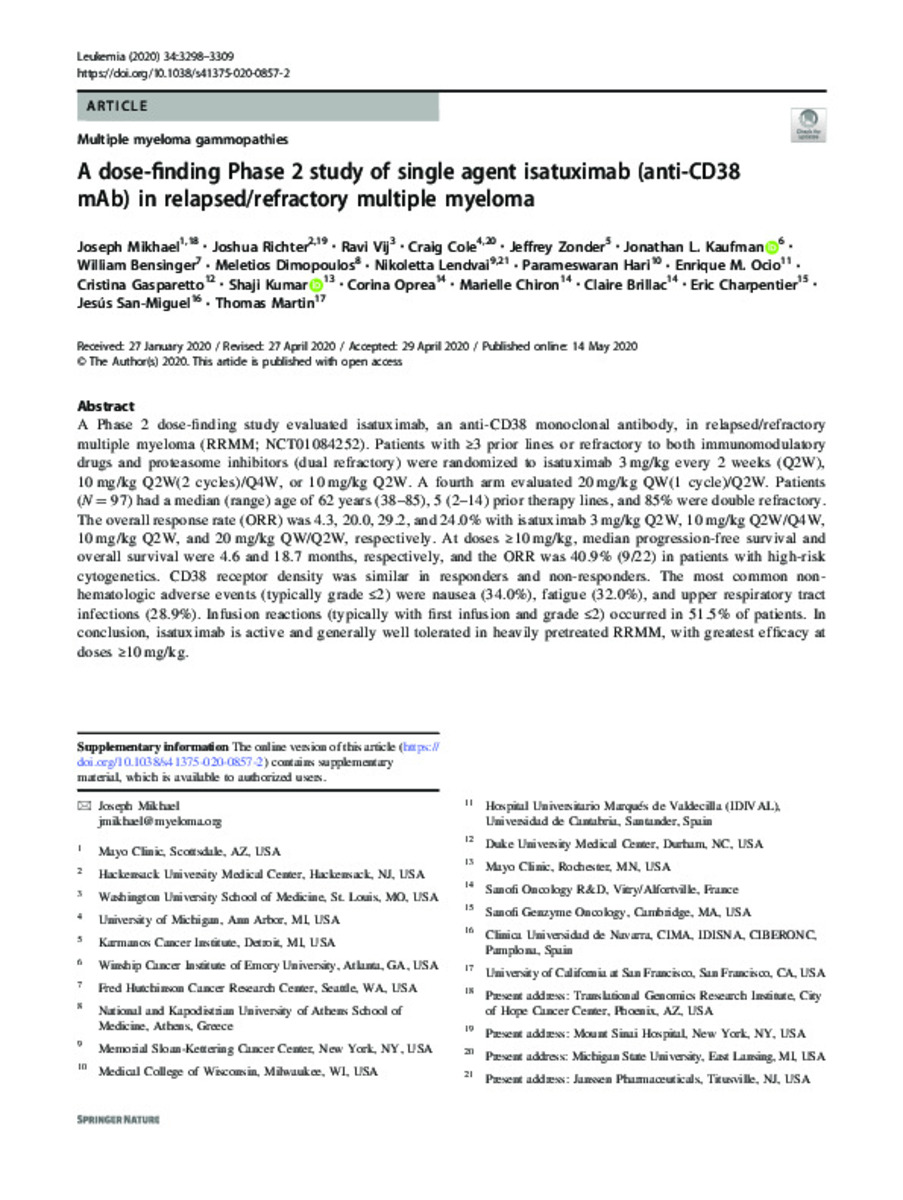Full metadata record
| DC Field | Value | Language |
|---|---|---|
| dc.creator | Mikhael, J. (Joseph) | - |
| dc.creator | Richter, J. (Joshua) | - |
| dc.creator | Vij, R. (Ravi) | - |
| dc.creator | Cole, C. (Craig) | - |
| dc.creator | Zonder, J. (Jeffrey) | - |
| dc.creator | Kaufman, J.L. (Jonathan L.) | - |
| dc.creator | Bensinger, W. (William) | - |
| dc.creator | Dimopoulos, M.A. (Meletios A.) | - |
| dc.creator | Lendvai, N. (Nikoletta) | - |
| dc.creator | Hari, P. (Parameswaran) | - |
| dc.creator | Ocio, E.M. (Enrique M.) | - |
| dc.creator | Gasparetto, C. (Cristina) | - |
| dc.creator | Kumar, S. (Shaji) | - |
| dc.creator | Oprea, C. (Corina) | - |
| dc.creator | Chiron, M. (Marielle) | - |
| dc.creator | Brillac, C. (Claire) | - |
| dc.creator | Charpentier, E. (Eric) | - |
| dc.creator | San-Miguel, J.F. (Jesús F.) | - |
| dc.creator | Martin, T. (Thomas) | - |
| dc.date.accessioned | 2023-02-13T12:51:45Z | - |
| dc.date.available | 2023-02-13T12:51:45Z | - |
| dc.date.issued | 2020 | - |
| dc.identifier.citation | Mikhael, J. (Joseph); Richter, J. (Joshua); Vij, R. (Ravi); et al. "A dose-finding Phase 2 study of single agent isatuximab (anti-CD38 mAb) in relapsed/refractory multiple myeloma". Leukemia. 34, 2020, 3298 - 3309 | es_ES |
| dc.identifier.issn | 0887-6924 | - |
| dc.identifier.uri | https://hdl.handle.net/10171/65409 | - |
| dc.description.abstract | A Phase 2 dose-finding study evaluated isatuximab, an anti-CD38 monoclonal antibody, in relapsed/refractory multiple myeloma (RRMM; NCT01084252). Patients with ≥3 prior lines or refractory to both immunomodulatory drugs and proteasome inhibitors (dual refractory) were randomized to isatuximab 3 mg/kg every 2 weeks (Q2W), 10 mg/kg Q2W(2 cycles)/Q4W, or 10 mg/kg Q2W. A fourth arm evaluated 20 mg/kg QW(1 cycle)/Q2W. Patients (N = 97) had a median (range) age of 62 years (38–85), 5 (2–14) prior therapy lines, and 85% were double refractory. The overall response rate (ORR) was 4.3, 20.0, 29.2, and 24.0% with isatuximab 3 mg/kg Q2W, 10 mg/kg Q2W/Q4W, 10 mg/kg Q2W, and 20 mg/kg QW/Q2W, respectively. At doses ≥10 mg/kg, median progression-free survival and overall survival were 4.6 and 18.7 months, respectively, and the ORR was 40.9% (9/22) in patients with high-risk cytogenetics. CD38 receptor density was similar in responders and non-responders. The most common nonhematologic adverse events (typically grade ≤2) were nausea (34.0%), fatigue (32.0%), and upper respiratory tract infections (28.9%). Infusion reactions (typically with first infusion and grade ≤2) occurred in 51.5% of patients. In conclusion, isatuximab is active and generally well tolerated in heavily pretreated RRMM, with greatest efficacy at doses ≥10 mg/kg. | es_ES |
| dc.description.sponsorship | This study was funded by Sanofi Genzyme (Cambridge, MA, USA). | es_ES |
| dc.language.iso | spa | es_ES |
| dc.publisher | Springer Nature | es_ES |
| dc.rights | info:eu-repo/semantics/openAccess | es_ES |
| dc.subject | Phase 2 study | es_ES |
| dc.subject | Relapsed/refractory multiple myeloma | es_ES |
| dc.subject | Proteasome inhibitors | es_ES |
| dc.subject | Isatuximab (anti-CD38 mAb) | es_ES |
| dc.subject | Multiple myeloma gammopathies | es_ES |
| dc.title | A dose-finding Phase 2 study of single agent isatuximab (anti-CD38 mAb) in relapsed/refractory multiple myeloma | es_ES |
| dc.type | info:eu-repo/semantics/article | es_ES |
| dc.description.note | This article is licensed under a Creative Commons Attribution 4.0 International License | es_ES |
| dc.identifier.doi | 10.1038/s41375-020-0857-2 | - |
| dadun.citation.endingPage | 3309 | es_ES |
| dadun.citation.publicationName | Leukemia | es_ES |
| dadun.citation.startingPage | 3298 | es_ES |
| dadun.citation.volume | 34 | es_ES |
| dc.identifier.pmid | 32409691 | - |
Files in This Item:
Statistics and impact
Items in Dadun are protected by copyright, with all rights reserved, unless otherwise indicated.






